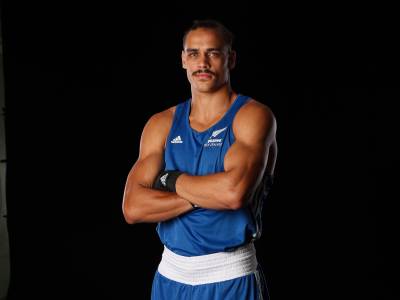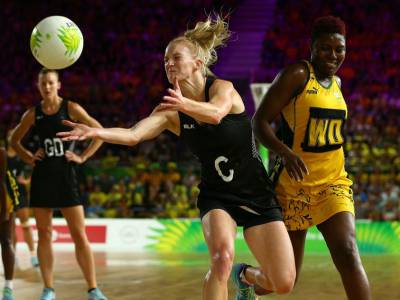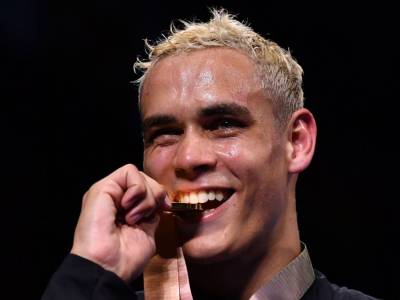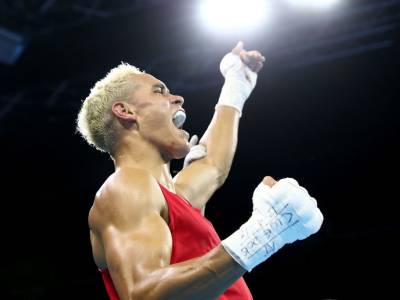New Zealand won two boxing medals, including a gold, plus athletics and hockey bronzes today.
The highlight, though, was the gold-silver effort of the big men in the boxing team, David Nyika and David Light.
BOXING
New Zealand picked up gold and silver medals in the boxing finals.
Rising light-heavyweight David Nyika beat Kennedy St Pierre of Mauritius in a unanimous decision to claim the gold. In the next fight Aucklander David Light had to settle for silver after losing a split decision to Canadian Samir El-Mais.
Nyika, 18, had four good wins on his way to the final and impressed critics with his style and composure.
The rangy, 1.91m Nyika was a late addition the New Zealand team after some good performances in Europe this year. He certainly repaid the selectors faith.
The Hamilton man looked composed throughout against St Pierre, though he tired a little in the closing stages.
St Pierre was keen to force the pace, but Nyika was able to use his reach to good effect to generally stay out of trouble and build up points.
The boxing finals were held at the Hydro Arena where, with nearly 10,000 vociferous spectators, there was an electric atmosphere.
In the mens heavyweight final, Light faced a very capable Canadian in El-Mais.
The Canadian won the first round comfortably, but the pugnacious Light fought back in the second, throwing in some good body shots and forcing the pace.
The final round was very close. One judge gave it to the New Zealander, but it was not quite enough and El-Mais took a really close decision. One judge gave the fight to him 30-27, and another 29-28. The third gave it to Light 29-28.
Light really impressed throughout the games with his gutsy attitude.
He had to really battle to make the final, winning a nip-and-tuck semi-final against Scot Stephen Lavelle.
Before today, the last New Zealand boxer to win a Commonwealth Games gold medal was superheavyweight Michael Kenny at Auckland in 1990.
ATHLETICS
Nick Willis produced a withering home straight sprint to earn a bronze medal in the 1500m.
Willis, the gold medallist in the event in Melbourne in 2006, and the bronze medallist in Delhi in 2010, was only eighth going into the final bend.
He was caught in a bunch on the final bend and took some time to get out wide and begin his finishing kick.
Willis, 31, looked to have left himself too much work to do but really wound up the pace as he stormed down the home straight, picking up a succession of runners.
He was fourth with five metres remaining, but outleaned South African Johan Cronje to grab the bronze by 0.05s.
The race was won by Kenyan James Magut, the silver medallist in Delhi, in 3min 39.31s, from 18-year-old countryman James Kwemoi, 3min 39.53.
Willis clocked 3min 39.60s and Cronje 3min 39.65.
The other New Zealander in the race, Nelsonian Julian Matthews, was ninth in 3min 41.84s.
The initial pace was rather pedestrian, which was why there were so many runners bunched going into the final bend.
Willis said the plan had been to stay in the middle of the pack for two laps and then track the Kenyans, but it didn't quite work out like that.
"It was a relief that I had actually salvaged a medal," he said, "but as you can see I ran over to the South African [Cronje] and said, 'Sorry mate, you deserved that far more than I did'. It was only my fitness that got (me) the medal."
The Commonwealth Games record for the distance still resides with Tanzanian Filbert Bayi, who ran a world record 3min 32.16s in Christchurch in 1974. Some great runners have won the gold medal in this event, including Jack Lovelock, Roger Bannister, Herb Elliott, Peter Snell, Kip Keino (twice), Bayi and Steve Cram (twice).
In the womens 5000m, Lucy van Dalen found the going very tough and finished 13th in 15min 58.43s. The race was won by world championship silver medallist Mercy Cherono in 15min 07.23s.
Javelin thrower Stuart Farquhar was attempting to improve on his silver medal in Delhi four years ago. He qualified comfortably, requiring just one throw of 78.54m.
However, in the final he seemed to struggle for rhythm on the slippery run-up it rained throughout the event. His first throw was a promising 78.14m, but thereafter he registered five no throws and ended up fifth. The event was won by Kenyan Julius Yego, who threw 83.87m. Trinidad and Tobagos Keshorn Walcott, who led the qualifiers with a whopping 85.28m, finished second with 82.67m.
HOCKEY
The New Zealand womens hockey team earned a bronze medal with a comprehensive 5-2 victory over South Africa in the third place play-off.
After their disappointing penalty shootout defeat in the semi-finals by England yesterday, the New Zealanders were determined not to be leaving Glasgow without anything to show for their efforts.
They got away to a good start when Anita Punt scored after six minutes. However, South Africa levelled the scores at 1-1 after 24 minutes.
New Zealand regained the lead a moment or two later when Krystal Forgesson converted a penalty corner and it stayed at 2-1 until halftime.
South Africa equalised for a second time after 49 minutes and it seemed as if despite looking the better side, New Zealand might be pushed to record a victory.
But three goals in the space of 13 minutes sealed matters.
Jordan Grant scored in the 55th minute, Gemma Flynn in the 62nd and Grant again in the 68th to stretch the final margin to 5-2.
New Zealand coach Mark Hager said his team played much better today.
There was more confidence there. It was important they got a medal after losing that match to England, he said.
New Zealand captain Kayla Whitelock said that once her side got on top she felt the goals would come.
It was great that they made the most of the chance to score some goals, she said.
Meanwhile, the New Zealand men led 2-0, but lost their semi-final to India 3-2. It was a disappointing result for the men, who looked to have the game well in hand for the first half-hour.
They got off to a dream start when they went ahead 1-0 in only the second minute, courtesy of a Simon Child field goal. When Nick Haig scored after a penalty corner in the 18th minute, New Zealand looked as if they would ease into the final.
The Indians got one back 10 minutes later courtesy of a penalty stroke and the score at halftime was 2-1. The New Zealanders will rue missed opportunities just before and after the interval, including one that Child would normally have converted.
As the second spell wore on, the Indian side looked increasingly confident, playing with pace and deftness. They equalised after 42 minutes and five minutes later forged ahead.
New Zealand pushed everyone forward near the end, and even pulled keeper Manchester off the field, but couldn't score a third goal.
In the other semi-final, Australia beat England 4-1, so New Zealand will meet England for the bronze medal tomorrow.
NETBALL
Defending champions New Zealand booked a place in the Commonwealth Games netball final in thrilling circumstances, beating England 35-34 in a topsy-turvy semi-final.
In the final New Zealand will meet Australia, who beat Jamaica 57-42.
There was never a moment when New Zealand could be assured of winning today.
It was 10-10 at quarter-time and during the second quarter England rocketed out to a five-goal lead. Amazingly New Zealand turned it around and led 20-19 at halftime.
At the end of the third quarter, it was 29-29 and the final 15 minutes were very closely fought, with heavy emphasis on defence.
New Zealands regular top shooting pairing of Cathrine Latu and Maria Tutaia have been carrying injuries and did not start. But coach Waimarama Taumaunu replaced fledgling goal shoot Ellen Halpenny after the first quarter.
Tutaia went to goal attack and Jodi Brown moved to goal shoot. However, Tutaia was far from her usual rock-steady self. She sank 15 of 25 attempts, for a 60 per cent success ratio, when she would normally look for something closer to 90 per cent. Brown scored 16 from 20. Overall New Zealand had 51 shots for 35 goals, just 69 per cent.
Part of the shooters problems could be attributed to the strong defensive effort of the English pairing of Geva Mentor and Eboni Beckford-Chambers, a point Taumaunu mentioned afterwards.
Similarly, New Zealand defenders Katrina Grant (for the final three quarters) and Casey Kopua made life difficult for England shooters Joanne Harten and Kadeen Corbin, who swapped positions for the final quarter, to no great effect. Corbin, in particular, struggled, scoring from just 14 of her 22 attempts, though she landed some good long-range bombs.
New Zealand captain Kopua said her teams big heart and the way they used their heads in the end got them home.
Though Taumaunu did not seem impressed with her teams shooting statistics, she praised her midcourters Liana Leota and Laura Langman for their perseverance and excellent efforts in moving the ball down the court.
I was pleased we were able to hold on and respond when the pressure went on, she said. We stayed calm. We have practised over and over for that final two minutes and it paid off today.
SQUASH
Second-seeded New Zealanders Martin Knight and Joelle King bowed out of the gold medal race in the mixed doubles when they lost their semi-final to the English pairing of Peter Barker and Alison Waters 11-3, 11-6.
The English had good credentials the left-handed Barker was third in the mens singles and Waters was fourth in the womens singles, beaten for the bronze by King. However, the New Zealanders made too many errors today.
The first game was over in nine minutes and though Knight and King got closer in the second game, which lasted 22 minutes, they were just not sharp enough.
Barker was the dominant player in the match.
We didnt start very well, New Zealand team manager Dave Clarke said. Martin and Joelle changed their plan a bit in the second and fought to 5-5 or 6-6, but you have to credit the English team for how well they played.
Knight and King will play the Australian team of Cameron Pilley and Kasey Brown for the bronze medal tomorrow, a repeat of the gold medal match in Delhi four years ago.
DIVING
In the mens 10m platform, Fengyang Li finished eighth with a total of 379.95. The event was won decisively by Englishman Tom Daley, with a score of 516.55.
Lis scores in the final were 58.50, 67.20, 74.25, 40.80, 67.20, 72.00. He had a couple of very good dives but paid dearly for muffing his fourth dive.
He had qualified earlier in the day no great credit there because there were 11 in the field with 12 to qualify! with scores of 51.00, 72.00, 79.20,66.30, 49.60, 73.60 for a total of 391.70.
Glasgow 2014 Commonwealth Games FengYang Li Ellen Halpenny Cathrine Tuivaiti Joelle King Martin Knight Casey Kopua Maria Folau Laura Langman Katrina Rore Liana Leota Jordan Grant David Nyika Julian Matthews David Light Devon Manchester Anita McLaren Nick Haig Gemma McCaw Simon Child Krystal Forgesson Michael Kenny Peter Snell Jack Lovelock Nick Willis Kayla Whitelock Stuart Farquhar Boxing Netball SquashTweet Share




